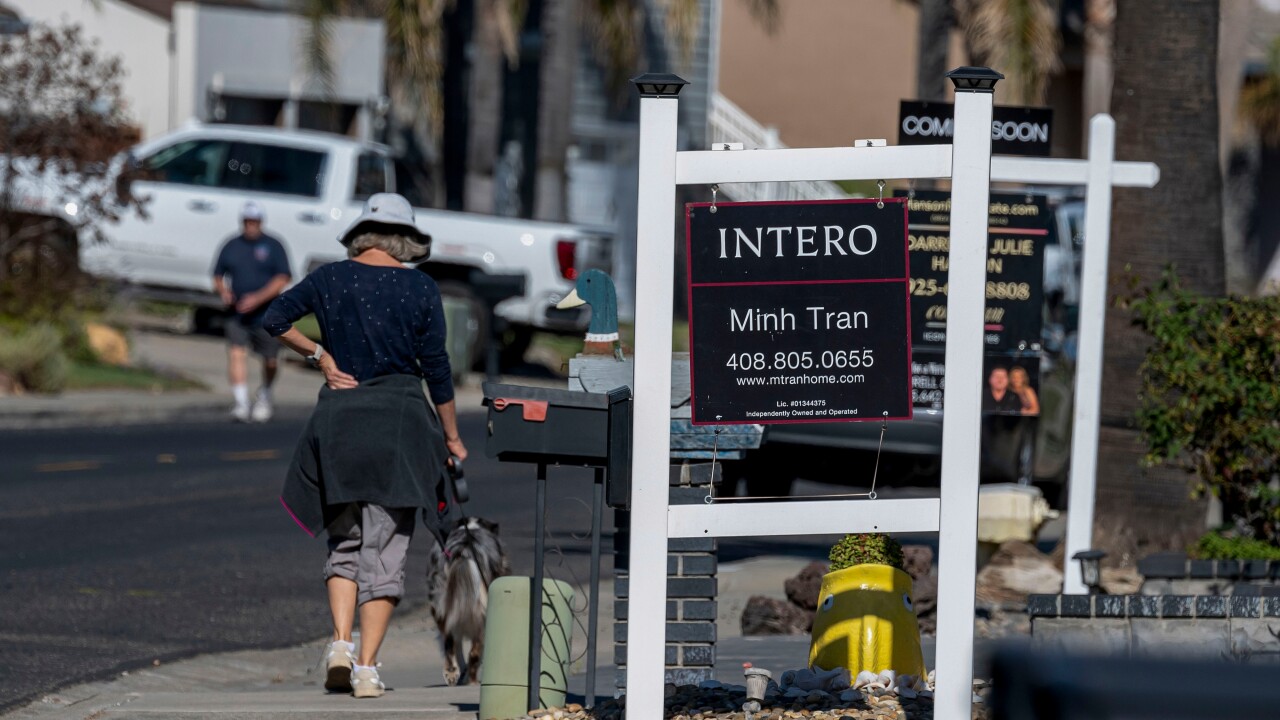
The Mortgage Bankers Association is trying to jump-start discussions around housing finance reform even as political dysfunction on Capitol Hill is reaching new lows.
The trade group released a paper Tuesday outlining a new plan designed to resolve the fate of Fannie Mae and Freddie Mac, which would call for creating several smaller public utilities that would buy federal insurance from the government for securities they issue.
"We recognize this is going to be a marathon, not a sprint, and obviously there are speed bumps that are taking place with the outset of a new Congress and the new administration," said Bill Kilmer, senior vice president for legislative and political affairs at the MBA during a call with reporters.
The MBA plan centers around creating private, shareholder-owned companies that would acquire loans and issue mortgage backed securities. However, the MBA said in order to maintain a deep, liquid market and the availability of the 30-year fixed-rate mortgage, the government will need to guarantee those securities, but minimize taxpayer exposure to a market downturn.
The plan arrives as Democrats and Republicans have all but declared open warfare on each other. Democrats boycotted a Senate Finance Committee confirmation vote for Treasury Secretary-designate Steven Mnuchin, which at least temporarily stalled the nomination and provoked fierce criticism from Republicans. The blowup illustrates the high level of partisan tensions at the moment, imperiling any effort at housing finance reform.
Below are takeaways from the proposal:
New Charters
The MBA would revamp Fannie and Freddie to become the first two "guarantors" of MBS in a new housing finance system, while also encouraging other entrants.
While under conservatorship, Fannie and Freddie have been coordinating to build a Common Securitization Platform that will soon allow the two government-sponsored enterprises to issue a single security. The MBA believes that platform should be converted into a government-owned corporation, which could do business with Fannie, Freddie and other private utilities.
"New entrants in addition to the successors to Fannie and Freddie would [get] charters as soon as possible to encourage competition," said Rodrigo Lopez, executive chairman of NorthMarq Capital and the MBA's chairman.
While Fannie and Freddie would probably have an initial advantage of being the first two companies chartered, they would also likely be considered systemically important financial institutions, which would subject them to tougher regulations that potentially give new, smaller entrants an advantage, MBA said.
The Federal Housing Finance Agency "or perhaps its successor would be the primary regulator, but because of the size of [Fannie and Freddie] we think they would fall under SIFI regulation, which would suggest a much higher intensity of supervisions including supervision by the Federal Reserve given their importance and impact on the financial markets," said MBA Chief Economist Mike Fratantoni.
The guarantors in the new system would also have a regulated rate of return to prevent the perverse incentives that led to Fannie and Freddie taking on too much risk.
"By regulating the return you can have the guarantors focus on the important work of service and new product creation and not competing on price," said Mike May, executive managing director at the Berkeley Point Capital and a member of a MBA task force charged with finding a solution to housing finance reform. "Price competition doesn't make sense, but competition in terms of innovation and the process and mortgage does make sense."
While the rate of return will be regulated and there will be more competition if there are more than two charters, borrowers will likely end up paying more because of the higher capital requirements and more oversight.
"In the end, our rough estimate is that costs may be slightly higher for consumers, but it is going to have to play out in terms of these two opposing forces" of competition and regulation, said Fratantoni.
Explicit Government Guarantee
Prior to the financial crisis, the GSEs had an implicit government guarantee as investors believed that the government would step in if there was a crisis — an expectation that turned out to be correct.
But instead of guaranteeing the MBS issuer, the MBA is proposing guaranteeing the securities themselves.
"The explicit guarantee of the MBS would ensure the timely payment of principal and interest in the event one or more of the guarantors failed during a crisis and became unable to remit scheduled pass-through payments to investors," the MBA paper said.
The chartered guarantors would acquire the MBS guaranty by purchasing it from a mortgage insurance fund, which would be funded by assessments on the charters.
"You think about it analogously as you do with the [Federal Deposit Insurance Corp.] and deposit insurance where the government is protecting the depositors and not the banking institutions," said Fratantoni.
Political Challenges
Members of both sides of the aisle in both the House and Senate have expressed a desire to tackle housing finance reform, including the leaders of the House Financial Services Committee and the Senate Banking Committee which have oversight of the government-sponsored enterprises.
"We are encouraged probably later in the year and early next year that the Congress will turn its attention to" housing finance reform, said Kilmer, who also pointed to remarks made by Mnuchin during a nomination hearing earlier this month that indicated he would like to address the GSEs. "Ultimately as the administration gets some of these key posts confirmed over time — particularly Treasury — they will be able to lean-in and put more concrete work together that will join with some of the things you have heard from Mr. Mnuchin during his confirmation process and others that going to be a symbol inside the new administration."
Yet the delay in Mnuchin's confirmation illustrates that Republicans and Democrats have a long way to go to bridge their differences.





